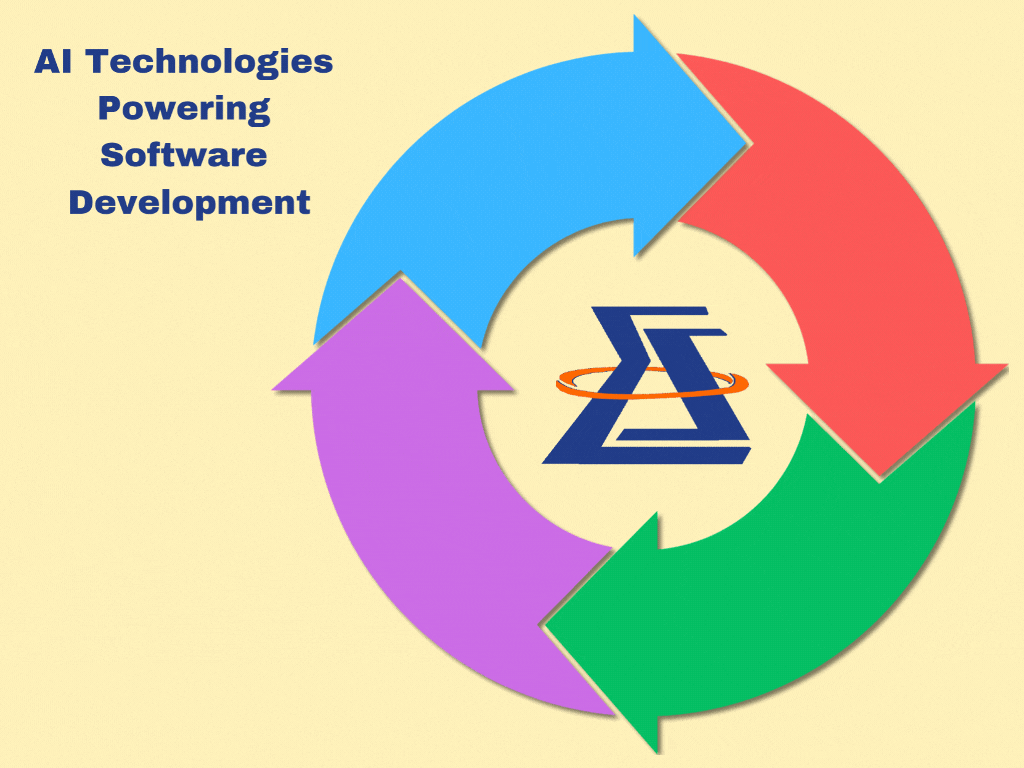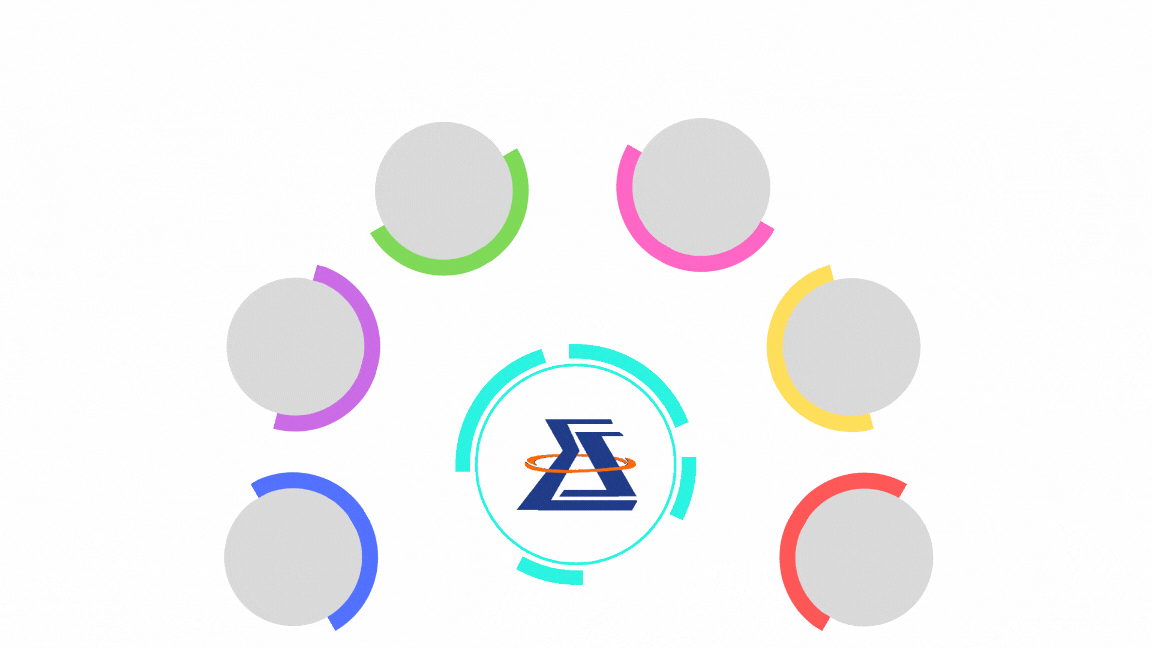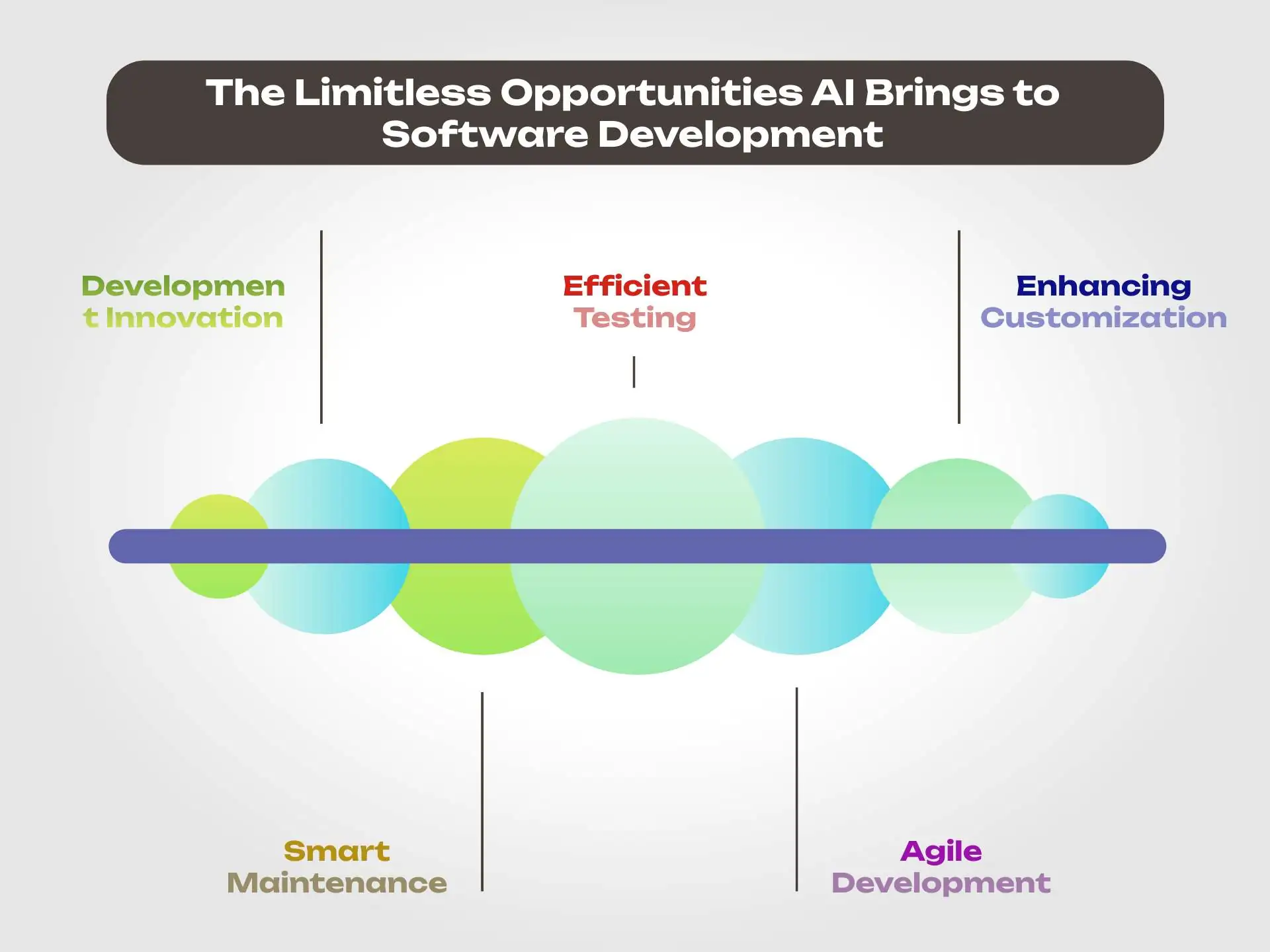Introduction
Asking if you have used chatGPT is rude nowadays. Most of us do, but not for software development. AI in software development has big advocates and a great agency. It is one of the fastest-growing software development trends in 2024. The Grand View Research expresses surprise over AI’s growing dominance in software development to the tune of an astonishing 37% between 2023 and 2030.
Believe it or not, AI is changing how we work and how we cook, and AI in the software development trend will continue in 2025 and beyond. Tech leaders, software developers, and enthusiasts are adapting to this new avenue for multiple reasons besides its being cost-effective. At Sigma Solve, we continuously explore new opportunities to learn and apply emerging technologies. We have been developing applications by integrating AI into software development and leading the trends. Let’s look at the various possibilities and define AI strategies for software development.
Contextualizing the Topic
The term Artificial Intelligence (AI) is no longer something far off in the future but a force with which software development can and is being reshaped. From coding assistants to algorithms, AI-enabled software development is bringing efficiency, innovative, and intelligent software solutions.
Why It Matters
AI consumption in software development is not just a phenomenon of the contemporary era; it is an essential tool applicable to every developer. The creative promise of AI in software development tools implies that the ways we think, build, test, and deliver software are changing for the better.
The Objective of Our Exploration
This thorough manual will consider artificial intelligence’s application in software development. In this tutorial, we will overview how machine learning, AI tools, and intelligent algorithms are transforming traditional software development approaches and what opportunities and risks can be expected.
Defining AI in Software Development
What is AI in Software Development?
AI is shifting software production from a static, application-based model of shape to an extensive, flowing system in which code is anything but simple—it learns, evolves, and adapts with greater levels of abstraction.
Artificial intelligence-integrated software development is a relatively unconventional approach in which humans and AI work together to design better and enhanced software solutions.
AI Technologies Powering Software Development

Machine Learning (ML)
Artificial intelligence allows the software to improve its function through data experience without programming. In software development, source code patterns are analyzed, future bugs are found, and possible optimizations are suggested, making development brighter.
Natural Language Processing (NLP)
NLP is a language interface between human and computer programming languages. Natural Language Processing (NLP) in development can also enable programmers to code as they speak, translate between specification and code, and improve relations between different software development teams.
Deep Learning
Deep learning enables the formation of a nerve network that can perform like the human brain. These networks can create complex structures in software, determine its behavior, and generate new ideas in development by analyzing the underlying pattern of the codes.
Robotic Process Automation (RPA)
RPA can be employed as a unique tool for automating all the monotonous work associated with software development. Performing raw coding relieves developers of the need to assume more high-level work, such as optimal problem solving, proper planning, and designing better innovative software solutions.
How AI Enhances the Development Lifecycle
AI-powered development tools are revolutionizing every stage of software creation. In software development, automation incorporated in artificial intelligence is helping developers by making intelligent design recommendations, testing software automatically, and predicting when equipment needs repair or replacement, among other benefits.
AI-Driven Development Tools
Code Completion
Other code completion applications, like GitHub Copilot for developers, instantly enhance the prompt with suitable code and significantly reduce working time. These intelligent assistants cope with the context, possible developer intentions, and the generation of the correct, syntactically accurate code snippets.
Automated Bug Detection
Automating code reviews of software testing tools is programmed to find areas within the code that can lead to bugs and other severe problems. These improved systems are intelligent; they are trained through prior code repository sources, enhancing the kind of errors seen and prevented.
Predictive Code Generation
Currently, where ordinary programmers are capable of writing simple lines of code, advanced AI algorithms can create entire modules of the project in question. These tools learn from other code bases and the patterns of coding that exist in software development cycles and automatically write sound code with the least human interference.
The Power of AI in Software Development: Key Applications

Many software technologies that reflect some amount of artificial intelligence are on the rise, helping developers design, improve, and support applications. By leveraging AI-powered development tools, teams can dramatically improve efficiency, reduce errors, and unlock unprecedented innovative potential.
Automating Repetitive Tasks in Software Development
AI-enabled software development dramatically reduces manual coding efforts by automating repetitive tasks. Through intelligent algorithms, it is possible to develop code, check syntax, and redesign existing code with incredible accuracy and in a very short time.
Top AI-Powered Automation Tools
GitHub Copilot
Graduated AI coding math assistant that proposes entire lines of code or function blocks. It uses millions of open-source repositories to learn from and serves relevant code suggestions that allow developers to become better decision-makers.
Tabnine
AI code completion is a well-developed tool based on deep learning that predicts and generates code. It is efficient, can handle numerous programming languages, and accommodates the programmer’s style.
OpenAI Codex
A highly effective advanced intelligent agent that interprets natural language into functional code. It can grasp the complexity of any programming need and then turn out the correct and optimum code in any language or framework.
AI in Code Quality and Error Detection
Artificial intelligence in coding has transformed error detection, enabling developers to identify and resolve potential technical glitches, bugs, and security-related vulnerabilities before they haunt them. AI-powered code checkers offer detailed checking capabilities of the codes, and this comes with high-end accuracy.
AI-Driven Quality Assurance Tools
DeepCode
A deceptively simple, brilliant tool that informs Jewelry through machine learning about various data in code repositories. It marks and locates possible bugs, security threats, and performance problems, indicating practical steps for developers.
Key Challenges AI Faces in Software Development
Artificial intelligence in software development isn’t a perfect solution. While AI-powered development tools offer incredible potential, they also present significant challenges that developers and organizations must carefully navigate and address.
Integration Complexity and Skill Gaps
AI-enabled software development requires more than just implementing new tools. AI integration with existing development environments presents organizations with intricate technical issues, and developing AI applications leads to large-scale changes to their workflow and infrastructure.
Skill Development Requirements
Developers must continuously evolve their skill sets to leverage AI technologies effectively.
- Learn advanced machine-learning concepts
- Understand AI model interactions
- Develop expertise in AI-powered development tools
- Master new programming paradigms
- Cultivate adaptive problem-solving approaches
Data Privacy and Security Issues
Artificial intelligence in coding raises critical data privacy concerns. Due to the exclusion of restrictive tool developers from the source code, AI tools may be designed with known security risks; these tools may inadvertently pose possible security risks to shareholders and the public as a whole if they reveal source code, implementation algorithms, or key production information to the public.
Security Best Practices
Implementing robust security measures becomes crucial when using AI development tools:
- Encrypt sensitive code repositories
- Limit AI tool access permissions
- Develop comprehensive data governance protocols
- Conduct regular security audits
- Create clear data usage guidelines
Algorithmic Bias and Fairness
Machine learning in software development can inadvertently perpetuate existing biases through training data and algorithm design. These biases may result in skewed code recommendations, furthering the existing systematic technical prejudices.
Mitigating Algorithmic Bias
Addressing AI bias requires multifaceted approaches:
- Diverse training data sets
- Regular bias detection mechanisms
- Transparent algorithm development
- Interdisciplinary review processes
- Continuous model refinement
Over-reliance on AI and Skill Erosion
AI-powered development tools offer remarkable capabilities, but excessive dependence risks diminishing fundamental coding skills. Web developers must balance supporting technology while maintaining key problem-solving skills.
Balanced AI Integration Strategies
Effective AI tool utilization involves:
- Using AI as a collaborative assistant
- Maintaining critical thinking skills
- Continuously learning underlying technologies
- Understanding AI limitations
- Preserving human creativity in problem-solving
Ethical Dilemmas and Employment Concerns
The rise of AI in software development raises profound ethical questions about technological automation and its potential impact on human employment. Developers and organizations must logically examine broader social consequences implicitly, step by step, and purposefully.
Ethical Considerations in AI Development
Key ethical challenges include:
- Preserving human job opportunities
- Ensuring fair technological access
- Maintaining transparent development practices
- Protecting individual privacy
- Promoting responsible innovation
Insight
Despite the rich promise of generative AI for software development, it should not be seen as a shot-in-the-dark solution. Successful integration, therefore, means a reasonable and stable sensitivity; the process of becoming sensitive to integration means a process of learning; the learning of integration should involve ethical practices in developing technology.
The Limitless Opportunities AI Brings to Software Development
AI is creating uncharted opportunities in the software development life cycle and in how ideas are conceived, implemented, and advanced. AI-powered development tools are not just changing tools—they’re reshaping entire development paradigms.

AI-Powered Innovation in Software Solutions
Artificial intelligence in software development is breaking traditional boundaries, enabling developers to create intelligent, adaptive software solutions that were once considered impossible. It sees the possibility of developers building applications to predict user needs and behavior, intelligent virtual assistants that are capable of learning their users and their needs, and optimal reactions to being used.
Breakthrough Innovations
Key innovative applications include:
- Predictive healthcare diagnostics
- Intelligent financial forecasting systems
- Advanced autonomous vehicle software
- Real-time language translation platforms
- Personalized educational technology
Smarter and More Efficient Software Testing
Machine learning in software development revolutionizes testing strategies by introducing intelligent, adaptive testing methodologies. Automobiles can use the functions AI-driven software testing tools offer, such as the ability to analyze previous test results, determine complicated edges, and automatically perform complicated test scenarios with higher precision.
Real-World Case Studies: Leading the Way in AI-Powered Software Development
Software development teams in large corporations and new-born startups experience AI disruption. These real-world examples showcase how AI-enabled software development is revolutionizing technology creation, deployment, and user experience.
Google’s AI Solutions for Developers
As a pioneer, Google realized AI impact on software development and developed groundbreaking tools that demonstrate the power of artificial intelligence in software development. Their AI-powered development tools are reshaping how developers create, test, and optimize software solutions.
Key AI Innovations at Google
TensorFlow: Machine Learning Powerhouse
TensorFlow helps developers to construct and train sophisticated machine learning algorithms in an environment that has never been easier. This is an open-source application capable of supporting detailed AI variations within numerous areas of application, including mobile application development and multisectoral scientific studies.
Cloud AI Platform
Google’s Cloud AI offers great potential for developers seeking highly effective methods of predictive analysis. It helps teams:
- Generate intelligent code suggestions
- Automate complex testing processes
- Create adaptive software solutions
- Optimize development workflows
- Implement advanced machine learning models
Microsoft and AI-Powered Developer Tools
Microsoft has successfully blended Artificial Intelligence into the development environment by creating tools that fundamentally transform the productivity and quality of developed applications.
Microsoft’s AI Development Arsenal
Visual Studio IntelliCode
- An AI-assisted development tool that provides:
- Contextual code completions
- Intelligent code recommendations
- Automated error detection
- Personalized coding suggestions
- Enhanced developer productivity
GitHub Copilot
- A revolutionary AI pair programmer that:
- Generates entire code blocks
- Understand context and intent
- Supports multiple programming languages
- Learns from the developer’s coding style
- Accelerates development processes
Netflix’s AI-Driven Content Personalization
Netflix shows how the successful integration of AI and ML in software development can produce disruptive user experiences. It constantly monitors user habits, enhances the suggestion of materials to display, and optimizes the software.
AI Personalization Strategies
Recommendation Engine
- Analyzes viewing history
- Predicts user preferences
- Creates personalized content suggestions
- Adapts in real-time
- Improves user engagement
Software Performance Enhancement
- Monitors system performance
- Predicts potential issues
- Automates testing processes
- Ensures a smooth streaming experience
- Continuously improves infrastructure
AI Adoption by Startups for Agile Development
Startups are tapping into software automation to enable new entrants to disrupt incumbents and develop distinctive, innovative solutions using AI in Agile development.
Startup AI Innovation Strategies
Rapid Prototyping
- Use AI for faster design iterations.
- Generate multiple solution concepts.
- Reduce development time
- Lower implementation costs
- Increase innovation potential
Intelligent Resource Allocation
- Optimize team productivity
- Predict project challenges
- Automate routine tasks
- Enhance decision-making
- Maximize development efficiency
Insight
Both of these case studies demonstrate that AI is not a trend in the technology field but rather a paradigm shift in software engineering. Companies that embrace the use of AI-based development tools will be the ones that pioneer technological innovation in the next generation of technology and produce more intelligent, adaptive, and efficient software solutions.
AI in software development: The future
With the current pace of technology, AI in software development is altering the way we build, test, and deploy our digital solutions. It’s no longer a question of whether AI will take over development but how and when it will happen, as it’s started slowly creeping into the software developer space to help drive increasingly intelligent, efficient, innovative ways of creating the technologies of tomorrow.
AI Trends to Watch in 2024 and Beyond
Emerging AI-enabled software development trends are revolutionizing developers’ work. Advances in machine learning, predictive coding, and intelligent automation make software development faster and smarter than ever before.
AI Enhanced Development Tools: The Evolution
With Artificial Intelligence in coding, developers currently have unprecedented opportunities at their disposal. The tools to build with AI are becoming more intelligent: They provide real-time code suggestions, automatic debugging, intelligent project management, and automate what would otherwise be a time-consuming, room-for-error process.
The Changing Role of Developers in an AI-Driven World
As machine learning in software development advances, developers are transforming from pure coders to strategic problem-solvers. Now, they are partners with AI, using intelligent technologies as tools to make work and creativity more practical and possible.
The Broader Impact on the Tech Industry
An AI software development company in the USA can now leverage artificial intelligence to create more competitive, efficient solutions. This technological revolution is creating new career opportunities, promoting near-flawless synergy, and redefining business models throughout the technology industry.
Conclusion: Embracing AI for a Future-Ready Software Development Workforce
The journey through AI in software development reveals a transformative landscape where technology and human creativity intersect. Thus, reviewing the enormous possibilities of artificial intelligence, it remains to state that the integration of these kinds of technologies is no longer a question of whether but how to increase the company’s chances in the modern, constantly developing technoscape.
Summary
AI-enabled software development brings remarkable advantages. From automated bug detection to code generation, AI assists developers in innovative and efficient work. Nevertheless, it has a long list of promising prospects for medical innovation compared to numerous difficulties.
Key insights include:
- It erases mundane code-writing activities.
- ML facilitates more predictable and responsive approaches to software development.
- Developers can solely concentrate on those valuable strategic problems for solutions.
How to Get Started with AI in Your Development Process
AI aficionados anxious to incorporate it in coding should begin step by step. Experiment with AI-powered development tools like GitHub Copilot, explore predictive coding platforms and gradually incorporate machine learning techniques into your workflow.
Practical steps:
- Pursue advanced learning in AI and ML through online courses.
- Experiment with AI code completion tools
- Join developer communities exploring AI technologies.
- Attend workshops and webinars on AI implementation.n
Final Thought: AI as the Catalyst for Innovation
An AI software development company in the USA understands that machine learning in software development is more than a trend—it’s a revolution. Further development of AI, together with the existing and new emerging trends, is effectively going to burst open new opportunities that are yet to be discovered by us, or even how they are going to redefine the very ways we think, design, and apply technologies in the ever-changing world.
Today’s generation of leaders should be open to new ideas, always absorb new knowledge, and see AI as a co-worker in creativity. They ought to maintain a spirit of curiosity and versatility and seek to be receptive to different things to capture AI’s unique capabilities and strength in delivering outstanding digital solutions.
Source: https://www.sigmasolve.com/blog/ai-in-software-development/








